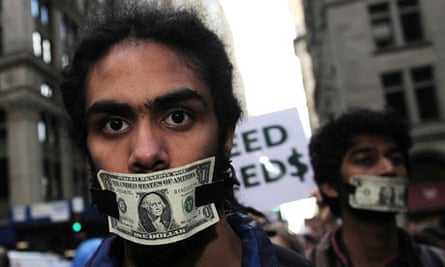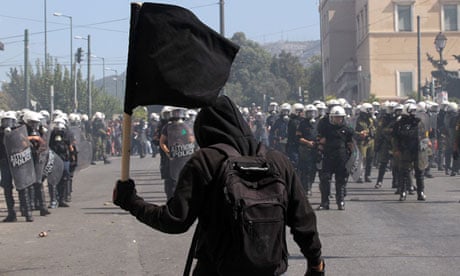Two years on from the fall of Hosni Mubarak, the new Egyptian president is from the Muslim Brotherhood; on the streets of Cairo, the same kind of people who died in droves in 2011 are still getting killed. On the streets of Athens, the neo-Nazi party Golden Dawn is staging anti-migrant pogroms. In Russia, Pussy Riot are in jail and the leaders of the democracy movement facing criminal indictments. The war in Syria is killing 200 people a day. It's an easy step from all this to the conclusion that 2011, the year it all kicked off, was a flash in the pan. But wrong. Something real and important was unleashed in 2011, and it has not yet gone away. I am confident enough now to call it a revolution. Some of its processes conform to the templates laid down in the revolutionary wave that swept Europe in 1848, but many do not: above all, the relationship between the physical and the mental, the political and the cultural, seem inverted.
There is a change in consciousness, the intuition that something big is possible; that a great change in the world's priorities is within people's grasp. The impervious nature of official politics – its inability to swerve even slightly towards the critique of capitalism intuitively felt by millions of people – has deepened the sense of alienation and mistrust.
But the changes in ideas, behaviour and expectations are running far ahead of changes in the physical world. There is greater space for democratic movements in the Arab world, but they are constantly menaced. "The Protester" may have made it on to the cover of Time – but not a single protest has yet achieved its aim.
If we take 1848–51 as a template, the crucial moments of reaction lie ahead: coups, crackdowns, intelligence-led disruption of the activists and hackers. But there is still one powerful factor militating against a return to stability of the kind achieved after 1848: the economy. Even if the Eurozone remains stabilised, and America avoids a political crisis over its budget, the developed world faces years of Japan-style stagnation.
In February 2011, in a blog titled Twenty Reasons Why It's Kicking Off Everywhere, I argued that there was a "new sociological type" at the heart of the global protests: "the graduate with no future". Since then indignados have flooded into Madrid's Puerta del Sol; Occupy camps have sprung up in hundreds of cities across the globe; and student protests in Chile and Quebec have completely changed the political atmosphere there. The anger is undimmed. But the limits of what young protesters are prepared to do have become more obvious.
Free-market capitalism offered the generation born after 1985 the moon and stars. Now, in the west, it can offer very little. Even for those with jobs, there is a dramatic scaling back of opportunity that makes no version of the future seem palatable. In Athens, I interviewed a female anti-fascist, who alleged she had been strip-searched and abused in the police HQ: what was her job? "I wait tables," she said, adding with an embarrassed laugh, "but I am a qualified civil engineer."
To survive, the young have become a generation of drifters, reliving the plotlines of movies from the 1930s. Without some massive and cathartic turnaround, the generation in their 20s, in the west, will never accumulate pay, conditions or savings at the level their parents did. What they are accumulating is resentment.
Reading this on mobile? Click here to view
In February 2011 I pointed to the use of social networks to organise protest, and argued that this had made "all propaganda flammable". Two years on there's a clearer pattern: the interaction of social media with a mainstream media that is, itself, undergoing rapid change. On protests you have started to see geeky men wandering around with a GoPro camera on a bike helmet, linked to a computer and a makeshift aerial, effectively live-streaming the action to niche blogs. But you also now have mainstream news networks live-streaming the protests, albeit sometimes from the safety of a rooftop or helicopter. Wherever the traditional media has the guts to do it, they can show the unedited truth about protests: who starts them, who escalates them, who behaves stupidly, who not.
On top of this, social media have grown more complex. Slowly, quietly, the mainstream media have become, for many involved in activism, politics and journalism itself, a secondary source of information, while social networks have become the primary source. This, in turn, speaks to the emergence of an undeclared dual power between the world of ideas and the world of official politics.
When the revolutions of 2011 began, horizontalism was the most obvious feature. But disengagement from ideology and structure was to play a major role in the defeat or failure of the progressive movements in 2012. In Egypt, once politics was reduced to a battle between the Muslim Brotherhood-led parliament and the remnants of the Scaf (the Supreme Council of Armed Forces), the weakness of Egyptian democratic and secular politics was exposed. Even after two years of riots, crises, scandals and crackdowns, Egypt has produced no large liberal or leftist party that is simultaneously against Islamism, and in favour of a rapid completion of the revolution. In the process of creating the National Salvation Front the opposition has had to re-order itself, with the traditional leadership types at the top, the youth at the bottom.

Egypt, in short, is the clearest example of the revenge of the hierarchy: the revenge of the 20th-century ideologies that globalist, secularist netizens had convinced themselves would expire of their own accord. And while there are many specifics to the Egyptian situation, 2012 closed with a foreboding that maybe the old forces – religion, fascism, Stalinist communism, militarism – could revive and conquer elsewhere.
Two years into the upheaval, the massive involvement of young, educated women in the protests remains one of its most salient features. There's been an obvious and predictable backlash: rapes and sexual assaults in Tahrir Square and in various Occupy camps. In India the gang rape of a female student sparked the launch a mass movement mobilising the educated youth.
Within the protest movements in the west there has also been the consistent problem of men assuming leadership, and dominating the discussion, even in forums where "consensus" and the various speaker "stacking" systems were supposed to prevent it.
In general, women have been able to organise to counteract such outright sexism. But the wider problem remains: if a movement has no demands, then how does it articulate what women's liberation consists of? How does it fit the issues raised by women's long-term and strategic oppression into the immediate social issues of the day? In the horizontalist movements, this problem has hardly begun to be addressed. At root – as, for example, the radical journalist Laurie Penny has observed – it is because feminism has achieved social mobility for some women, and even a symbolically liberated lifestyle, but at the price of a truce over the economic and social subjugation of all women.

If you take a wide-angle view of this dilemma – personal liberation replacing a struggle for general economic and social liberation – it's simply a subset of the overarching problem with the movements of 2011–12. Being a counter-culture – or even a "counter-power" – is a viable strategy only as long as the dominant cultures and powers are benign and stable.
With hindsight, late 2011 was the moment the sheen on horizontalism faded. In Spain, the leading voices within the indignado movement became frustrated by the obsession with "process". The tyranny of consensus and hostility to political demands sucked away their momentum. Some have now organised a party – Partido X – whose debut political broadcast on YouTube featured a man in a tie.
With Occupy Wall Street, critics point to an emergent self-obsession. "There is a danger. Don't fall in love with yourselves," Slavoj Zizek told the protesters in Zuccotti park. "What matters is the day after, when we will have to return to normal lives. Will there be any changes then?"
The journalist Thomas Frank excoriated Occupy for its self-obsession, its refusal to express demands, comparing its minimal achievements with those of the Tea Party. Frank called for a movement "whose core values arise not … from the need for protesters to find their voice, but rather from the everyday lives of working people."
However, both in the US and Spain, the occupiers did – once their ability to capture physical space was suppressed – attempt to move towards everyday life. By mid 2012, wherever you went in Spain, you could find movements of the working class and poor that had become infused with a 5% dose of horizontalist activism. In the US, when Superstorm Sandy devastated parts of New York and New Jersey in November 2012, overwhelming the federal emergency response services, Occupy activists surged into the breach, organising food kitchens, emergency power supplies, informal car ferry schemes and emergency shelters. Soon the hashtag #OccupySandy was trending.
When the history of this crisis is written, one of the most fascinating tasks will be to document the memes that flowed throughout it. It will not be easy: the digital human consciousness is playful. Thousands of jokes are made each day on Twitter consisting, for example, of fake book titles on some iconoclastic theme. It will not be enough to document what they were, but who made them; the speed at which the irony flowed; were people at work when they retweeted? Did the meme stay local, or did it go global?

From Tahrir to Puerta del Sol, the most important thing about the slogans, images and gestures is not what they said in isolation but what they expressed cumulatively: the woman who walked naked through the riot outside the Spanish parliament, holding a sign saying "peace"; the video of Loukanikos, the Greek riot dog, which went globally viral in the summer of 2011; the "No Pasaran" T-shirt worn by Pussy Riot member Nadezhda Tolokonnikova in the dock.
These were first of all signifiers of rejection: scorn not just for the elite world of yachts, diamond watches and bodyguards, but for the everyday world of corporate conformity. Through these signs and symbols, large parts of humanity were signalling their solidarity to one another; their belief that a kinder, more human system is possible; and that it would be born out of the chaotic, ironic, playful qualities of human life – not by pitting one cruel hierarchy against another.
And this is why all exhortations to "formulate demands", embrace structure, or turn to "everyday life" miss the point: the activists' unwillingness to engage is precisely what has allowed them, up to now, to disrupt the timetable of official politics.
Two years ago I identified the defining character of this protest generation as follows: "People have a better understanding of power. The activists have read their Chomsky and their Hardt-Negri, but the ideas therein have become mimetic. Young people believe the issues are no longer class and economics, but simply power: they are clever to the point of expertise in knowing how to mess up hierarchies and see the various 'revolutions' in their own lives as part of an 'exodus' from oppression, not – as previous generations did – as a 'diversion into the personal'."
If I could list only one and not 20 reasons why it is still kicking off, it would be the rise of the networked individual colliding with the economic crisis. Something fundamental has happened – a shift in human consciousness and behaviour as momentous as that triggered by the arrival of mass consumption and mass culture in the 1900s.
I am drawn to Virginia Woolf's comment: "On or about December 1910 human character changed." She was referring to a revolution in social life and art, which made the literary tools and conventions of the Edwardian era "dead for us". The protesters have made the 20th century seem as alien and remote as the 19th century was to Woolf and her circle.
The change, as sociologist Manuel Castells argues, is one-off and irreversible, like electrification, and it will condition all politics going forward. So the challenge for traditional politics, right and left, religious and secular, is, as Castells argues, that the networked social movements actually reflect the reality of "everyday" or "normal" life better than the old hierarchical forms. Exhorting them to "turn to the masses" misses the point: economic crisis is forcing large numbers of people to adopt behaviours that were once deemed "lifestyle choices" (squatting, bartering, sofa-surfing, the grey economy). If Castells is correct, we can expect horizontalism to survive its first winter of discontent, and to resist simple absorption into the trade unions or the liberal and social-democratic parties.
Now the movements are at a turning point. Their "revolution" remains trapped at the phase of ideology, culture, political debate. The real changes desired by those who protest are still only achievable by those prepared to wield hierarchical power: be it Egyptian opposition leader Mohamed ElBaradei, President Obama or Greek leftist leader Alexis Tsipras, waiting nervously in the wings.
The radical youth do not disdain "ordinary" or "everyday" life, or the unwashed, uneducated masses; nor do they fear to go up against batons and even bullets: the Indian anti-rape protests are just the latest proof of this. What they disdain and fear are the politics of traditional power. In the process of overcoming this, they will probably be forced to engage with the things they despise: compromise, parliamentary politics, the art of the possible, political Islam, organised labour. The question then is: on whose terms, and with what politics?
Here, there is a parallel with the 1930s that is worth exploring. The first four years of the crisis, from 1929 to 1933, were not marked by effective mass resistance. That happened later. The early 1930s saw social disorientation, catastrophic policy choices, dysfunctional and autocratic governments and the rapid rise of the fascist right.
It was Hitler's rise to power in 1933 that focused minds, amid the fear that something similar could happen in France, Austria and Spain. At the same time, Roosevelt's New Deal signalled the possibility of a progressive government after all. The events of 1933-34 forced movements that had been socially weak, divided, heavy on rhetoric and self-obsessed, to, basically, get real. Fear was the key.
Although you can – as the anarchist slogan says – "live despite capitalism", you can't live "despite" fascism, genocidal racism, extreme sexual counter-revolution and war. As the gears of mainstream politics and economic crisis clash and grind above their heads, I would expect this realisation to be the guiding factor in where the movements that began in 2011 turn next.






Comments (…)
Sign in or create your Guardian account to join the discussion